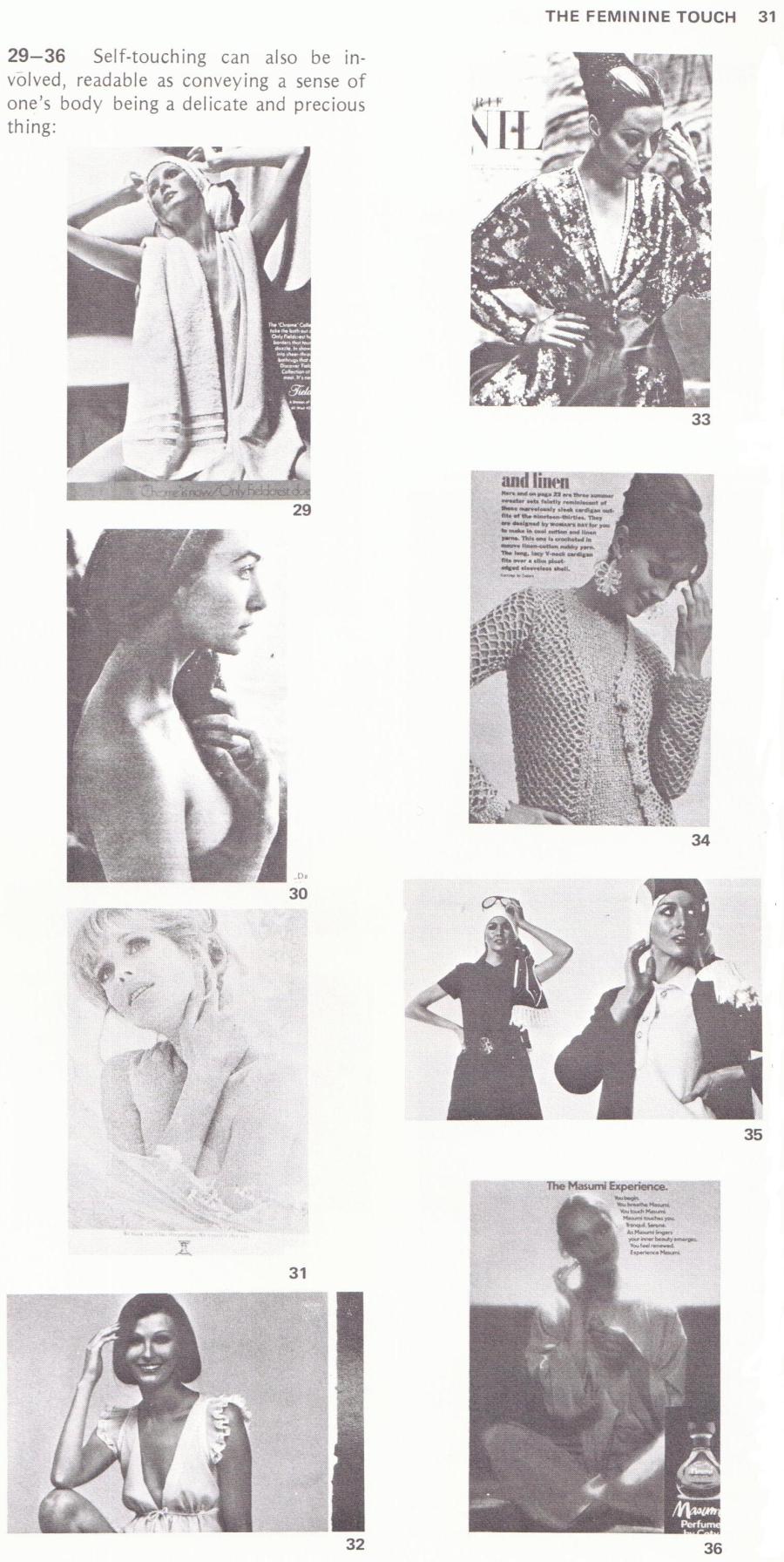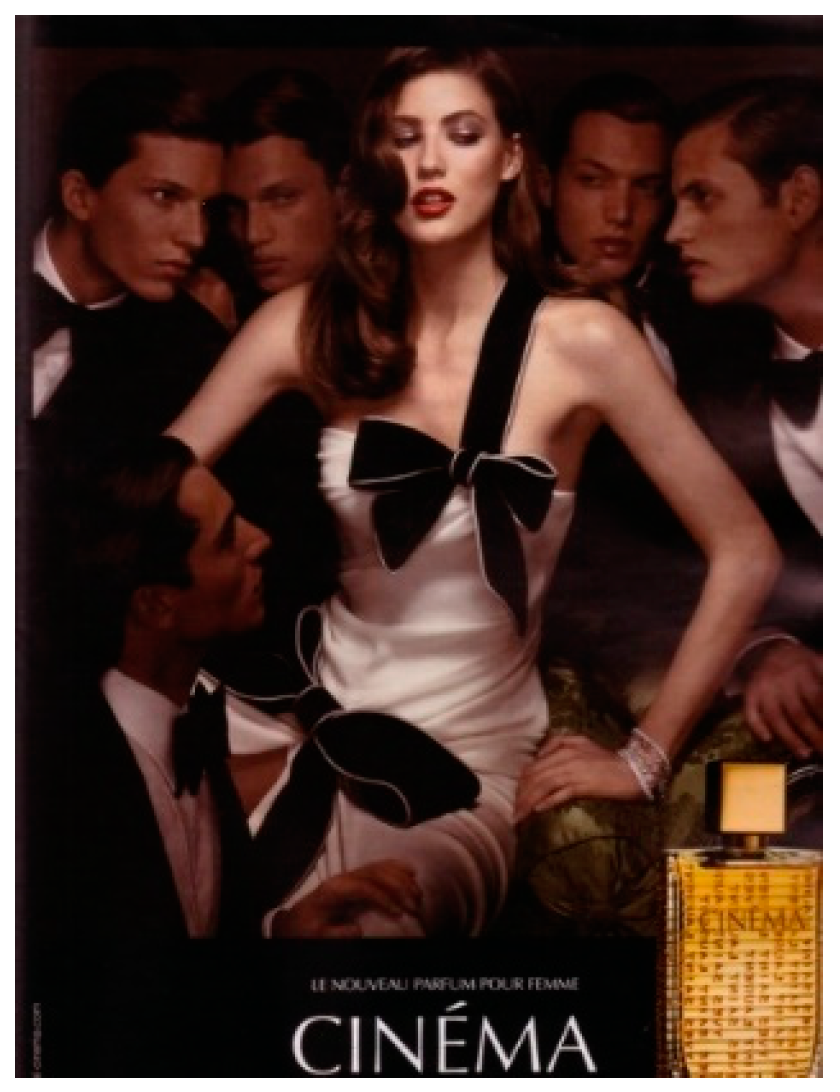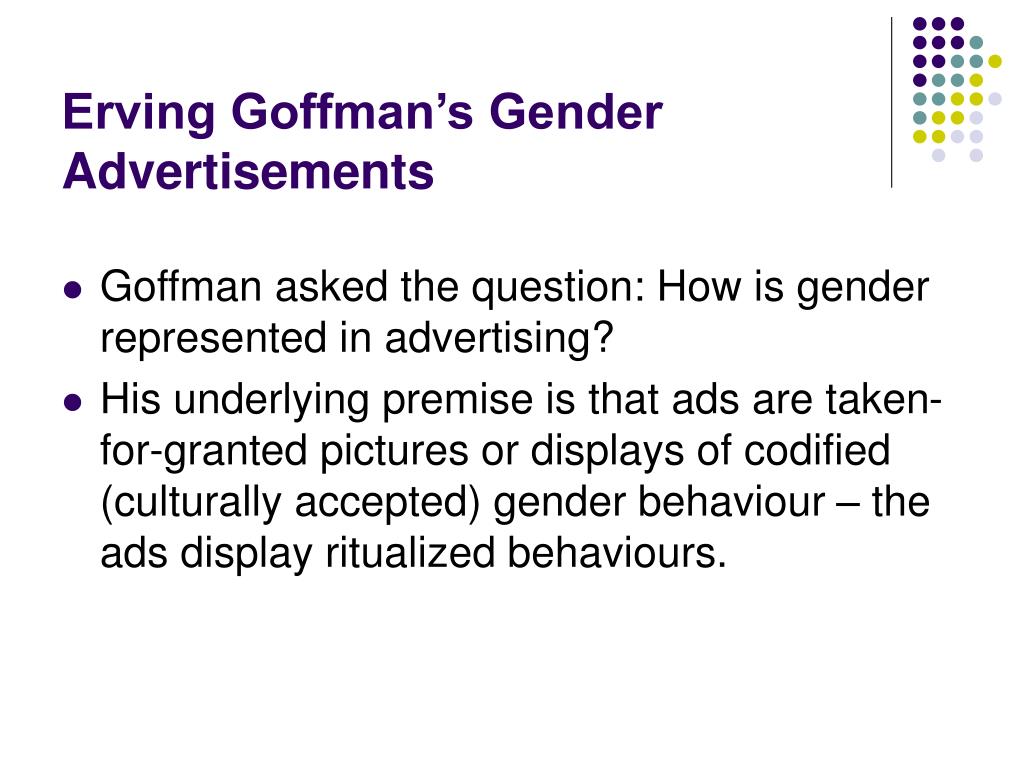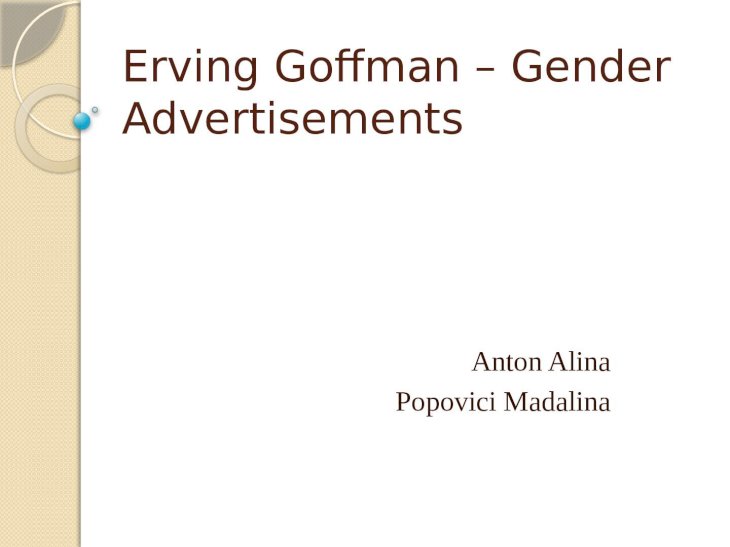
Gender Advertisements by Erving Goffman — Reviews, Discussion, Lists
Advertising is a significant agent of socialization in modern industrialized societies, and is used as a tool to maintain certain social constructions, such as gender. Men and women are depicted as differing in attitudes, behavior, and social statuses. [2] These images are crafted to mimic real life and many mistake the concepts of fantasy and.

Blackpink’s Rosé Deserved So Much Better Than the “Young Silly Woman Puts Product on Head
Gender Advertisements Home Textbook Authors: Erving Goffman Part of the book series: Communications and Culture (COMMCU) 1730 Accesses 383 Citations 14 Altmetric Sections Table of contents Keywords Bibliographic Information Publish with us Table of contents (3 chapters) Search within book Front Matter Pages i-viii PDF Gender Display Erving Goffman

Erving Goffman Feminine Touch p. 31. Gender Advertisements The Grand Narrative
Gender Advertisements. Erving Goffman. Harper & Row, 1979 - Sex role in advertising - 84 pages. From inside the book . Contents. I. 1: II. 10: III. 24: 7 other sections not shown. Other editions - View all. Gender Advertisements Erving Goffman Snippet view - 1979. Gender Advertisements Erving Goffman Snippet view - 1976.

Table III from Gender Stereotyping in Advertisements the Relevance of Goffman’s Study for
Erving Goffman. Royal Blind Society of NSW Student and Special Request Service. On face-work: an analysis of ritual elements in social interaction. Encounters: Two studies in the sociology of interaction.

Artist Reverses Gender Roles In Sexist Vintage Ads To Give Sexist Men A Taste Of Their Own
Goffman's work, Gender Advertisements, forms the basis for hypotheses about how male and female participants would be represented in terms of eight dimensions of visual structure, derived.

Korean Sociological Image 66 Inventing Labels for Women’s Bodies The Grand Narrative
Goffman published Gender Advertisements, a groundbreaking study of the representation of women in commercial advertisements. Goffman's work demonstrated the advertising industry's infantilization of women, despite the progress of the women's rights movement, and noted seven phenomena that were prevalent throughout the purposive sample. These

Proceedings Free FullText A Study of Gender Advertisements. A Statistical Measuring of the
In 1979, Erving Goffman published Gender Advertisements, the seminal work in critiquing gender displays in advertising. Goffman noted seven major phenomena that demonstrated the cultural infantilization of women and their ritualized subordination in advertisements. This study, conducted in Goffman's phenomenological tradition, investigates modern commercial advertisements to update Goffman.

PPT Nonreactive Research PowerPoint Presentation, free download ID398405
Goffman's modest claims about the "proper" study of interaction (in a work designed to show us our many improprieties), is a psychology that is decidedly anti-psychological and, certainly, anti-psychiatric; it is anti- a number of things. It disavows (mocks, really) anything that has claims to universal importance.

Goffman’s Gender Advertisements Introduction to Media Studies
The fate of Goffman's Gender Advertisements in the sociological literature is reviewed nearly two decades after its original publication. The paper underlines Goffman's consistent social constructionist approach to gender differentiation, an approach which still contains much of relevance to a range of feminisms. Its singularity resides in its.

Goffman was interested in the strategy and tactics of social interaction. In his book Gender
Similarly, Goffman's perspective on "mortification of self" (1959, 1961a), "gender advertisements" (1976/1979, 1977), "aligning actions" , and "impression management" (1959, 1967) reveal the ways in which women's lives are circumscribed and limited by conventions. It is noteworthy that these concepts permeate the entire corpus.

Gender Advertisements Erving Goffman Erving, Gender, Gender issues
Gender Advertisements is a 1979 book by Erving Goffman. [1] [2] [3] [4] Goffman's work has led to a number of further studies. [5] [6] [7] In Gender Advertisements, Goffman analyzes how gender is represented in the advertising to which all individuals are commonly exposed. [8]

Nonreactive Research Neuman and Robson Ch 10
Gender advertisements by Goffman, Erving. Publication date 1979 Topics Sex in advertising Publisher Cambridge, Mass. : Harvard University Press Collection printdisabled; internetarchivebooks Contributor Internet Archive Language English. ix, 84 p. : 29 cm

sexist moschino advert 4, 2000 this one is revealing in t… Flickr
For this research, advertisements were analyzed the gender behavior portrayed, utilizing Goffman's categories of decoding behavior: relative size, feminine touch, function ranking, ritualization of subordination, and licensed withdrawal. Body display and IndependencelSelf-assertiveness categories were added.

Erving Goffman Gender Advertisements.pptx [PPTX Powerpoint]
Erving Goffman's gender display framework is a typology of nonverbal posing codes that connote the subordination of women in commercial imagery and a prominent tool for assessing visualizations of gender stereotyping in mass media.

Goffman Erving 1979 Gender Advertisements Cambridge MA Harvard
Gender advertisements Bookreader Item Preview. Gender advertisements by Goffman, Erving. Publication date 1979 Topics Sex role in advertising, Sex role -- Case studies, Sex roles Social aspects Publisher London : Macmillan Collection printdisabled; internetarchivebooks Contributor

(PDF) Goffman's Gender Advertisements revisited Combining content analysis with semiotic analysis
An analysis of 827 advertisements from a representative sample of magazines demonstrates that an abstract framework from Systemic Functional Analysis can be used to identify the semiotic resources which are the basis for gender stereotypes. Resources such as perspectival angle, plane of composition and gaze are used to investigate stereotyped portrayals of males and females. Goffman's work.